|
|
|
Sort Order |
|
|
|
Items / Page
|
|
|
|
|
|
|
| Srl | Item |
| 1 |
ID:
101848
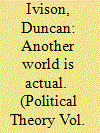

|
|
|
|
|
| Publication |
2011.
|
| Summary/Abstract |
There have been two distinctive aspects to James Tully's approach to the study
of imperialism over the years, and both are put to work in these remarkable
volumes.
1
The first is his belief in two seemingly contradictory claims: (i) that
imperialism is much more pervasive than usually thought (conceptually, historically and practically); and yet (ii) that there are many more forms of resistance to it than usually appreciated. The second is the way Tully places the
situation of indigenous peoples at the heart of his analysis. This goes back to
his groundbreaking work on Locke, and his extraordinary re-interpretation of
Locke's work in the context of early modern discourses of imperialism. But the
situation of indigenous peoples also deeply informed his argument in Strange
Multiplicity
2
-and not only in terms of the central motif of the lectures provided by Haida artist Bill Reid. In that book, he sought to reveal and defend a
much richer conception of legal and cultural pluralism than had hitherto been
appreciated by liberal constitutionalists and their critics. Indigenous peoples
are not simply a litmus test for our thinking about pluralism but represent a
much deeper challenge to the way we conceptualize notions of citizenship,
sovereignty, democracy and freedom in the first place-and indeed the nature
of political philosophy itsel.
|
|
|
|
|
|
|
|
|
|
|
|
|
|
|
|
| 2 |
ID:
142066
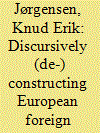

|
|
|
|
|
| Summary/Abstract |
This article is about European foreign policy, specifically an examination of ways in which discourse analysis and foreign policy analysis can be brought together. The first aim of this article is to explicate the explanandum in some detail. Before we know what we are looking for, it gives limited meaning to consider procedures for methodological procedures. Once the explanandum has been identified, the article examines theoretical approaches and critically discusses their promises and limitations. Priority is given to the option of applying constructivist discursive theories that might (or might not) have been developed with a view to analysing foreign policy, including European foreign policy. In doing so, the article aims at bridging several sometimes very different fields of study: discourse theory, which is sometimes utterly unaware of or uninterested in foreign affairs; and foreign policy analysis, which is frequently descriptive in orientation and at times characterized by less-than-benign neglect of discourse theory.
|
|
|
|
|
|
|
|
|
|
|
|
|
|
|
|
| 3 |
ID:
101845
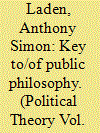

|
|
|
|
|
| Publication |
2011.
|
| Summary/Abstract |
What I would like to do in these brief remarks is offer a characterization of
what James Tully calls public philosophy, in part by situating it amongst other
more familiar positions in contemporary political philosophy, but also in part
by suggesting how once we grasp what is distinctive about this approach, it
can help us see that familiar terrain anew. To keep to Tully's musical metaphor, this will be an exercise in amplifying the bass line, the ostinato, in order
to make it easier for the rest of us to join Tully in his new key. With limited
space, what I say will be more suggestive and sketchy than I would like. It will
amount to humming a few bars in the hope that others can take up the tune. Or,
to use one of Tully's favorite images from Wittgenstein, to count 2, 4, 6, in the
hopes that you will know how to go on.
Let me start with a very crude map of three trends in contemporary political philosophy
|
|
|
|
|
|
|
|
|
|
|
|
|
|
|
|
| 4 |
ID:
101846
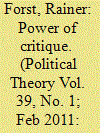

|
|
|
|
|
| Publication |
2011.
|
| Summary/Abstract |
I regard James Tully's work to be among the most important and innovative
in the contemporary field of what we could call critical political theory. This
not least for the reason that, apart from its many virtues, such as its unique
combination of historical and contemporary social analysis, Tully's approach
explicitly places the theoretical and practical task of social criticism at its
methodological and normative center.
1
I highlight "theoretical and practical"
here to indicate that I will raise some questions about the relation between the
two, and I also highlight "methodological and normative" to do the same
|
|
|
|
|
|
|
|
|
|
|
|
|
|
|
|
| 5 |
ID:
101847
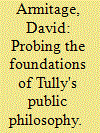

|
|
|
|
|
| Publication |
2011.
|
| Summary/Abstract |
James Tully's Public Philosophy in a New Key is a complex intellectual edifice. Tully deftly deploys the philosophical tools forged by, among others,
Wittgenstein, Arendt, Foucault, and Skinner to dismantle the architecture of
modern political reason in order to build in its place a more robust structure
adequate to the needs of a "de-imperialising age."
1
The resources he uses are
unusually diverse, ranging across the whole canon of Western political
thought, via historical methodology and critical philosophy, to the works of
contemporary public activists. The result, to paraphrase one philosopher who
is definitely not part of his synthesis, is a building for dwelling, and a dwelling for thinking
|
|
|
|
|
|
|
|
|
|
|
|
|
|
|
|
|
|
|
|
|